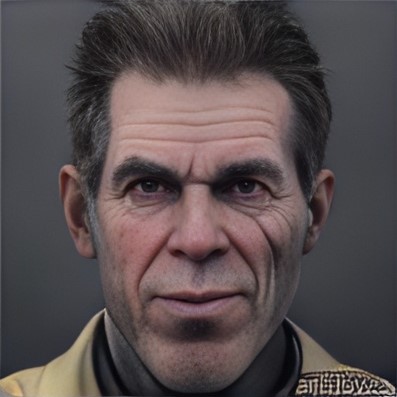The World of the NPC-i (Non-Player Character, idiot)
This is an expanded version of an article that originally appeared in Cepheus Journal #012, and in this form in the July/August 2023 issue.
There are some people who go beyond incompetence and into total stupidity. This is a suggestion for NPCs, but it can also be used with player-characters if you really want to develop your role-playing abilities.
Ideally, NPCs will have authority over the PCs, so a local ruler (or their offspring), a client whose business you need to retain or even the civilian or military commander who has been promoted because of family ties.
These NPCs have negative understanding. Most people admit that they don’t know how to do something, such as how to tune a guitar or speak German, but the NPC-idiot (NPC-i) is characterised by massive confidence and ego; they will never admit that they don’t know something. If they try and fail, it is never their fault. So the guitar is at fault or the dialect the native speaker is using is not how Standard German works.
This attempts to make idiot NPCs behave in a consistent manner. It is intended to add flavour to their stupidity, as not all stupid people act the same way.
Identifying the NPC-i
Characters that have INT of 3 or lower using standard characteristic generation are NPC-i. You might want to allow for INT 4 to be considered NPC-i, but this is borderline. Where INT is relevant in this article, it will be assumed to be 3-.
Fleshing out the NPC-i: Optional Characteristics
There are a few extra [optional] characteristics that can be used to help you make each NPC-i unique: Ego (EGO), Emotional Thinking (EMO), and Ethics (ETH). Each should be rolled as 2D6. Whenever an NPC-i interacts with a PC, roll against EGO, EMO or ETH to see if they behave in a particularly stupid manner.
Ego (EGO)
People with high EGO tend to want to make it all about them, regardless of what ‘it’ is. In any situation, their preferred course of action will be whatever directly benefits them the most. They don’t like to be told they are wrong. Ever. Nor will they ever willingly acknowledge that they may not be the most important person in a situation. Their usual reaction to failure (or being wrong) is to blame other people, to lie, or to blame the equipment. Roll 2D6 against EGO; if the roll is below EGO, the character will act (or react) in a selfish way.
High EGO combined with low EDU characterises someone who believes all sorts of nonsense; they have no critical thinking ability and will accept anything they are told if it suits their purpose. They are right, no matter what you say. Your qualifications in the subject, acquired after years of study, mean nothing to this person.
High EGO combined with high EDU characterises someone who knows a lot and lets you know it, all the time. They have a lot of facts at hand, but have little or no ability to apply them to a situation appropriately. They are always trying to impress you with references from history, art, literature, philosophy and culture. They will lecture you on anything. They dislike anyone who knows more about a subject than they do. Show them they are wrong and you’ve made an enemy.
High EGO with low SOC is someone who might try to convince you that they are part of the nobility, adopting airs and graces (often incorrectly or inappropriately), slavishly agreeing with anything said by people with high SOC. They may well be a social climber, trying to flatter high-SOC people, trying to get invites to their social events (and pretending to have attended even if they have not). If challenged (because you were there and they were clearly absent) they always have an excuse. They were called out to deal with some crisis by the person in charge and must have missed seeing you.
High EGO and High SOC is ‘the rich idiot’; if you are not part of their in-crowd, you are no one. They will constantly put down anyone and everyone, protected by their contacts in high places. For them, actions have no consequences. If you don’t attend the same events, know the same people and have the same interests, you aren’t worth their time.
Emotional Thinking (EMO)
People with high EMO behave without thinking about the outcomes, doing what they want to because they ‘feel like it’. If you oppose them in anything, they will react. High EMO can mean someone is bad-tempered: If something doesn’t go their way they lose their composure. They are also likely to take anything personally.
Roll 2D6 against EMO; if the roll is less than EMO, the character is likely to do something that is an emotional reaction to the situation, even though the consequences may be disastrous.
High EMO and low EDU characterises someone who dislikes anyone more clever than they are. If you know the way to fix something, they know a better way and will oppose you if you dare try and do it your way. They don’t recognise any qualification they don’t have and think anyone better educated is trying to fool them.
High EMO with high EDU characterises someone who is dismissive of anyone’s knowledge that they don’t share; you are clearly inferior in knowledge and should keep quiet as you need to learn something. They never give any praise, even for successful ideas.
High EMO and high SOC is another rich spoiled brat; they do whatever they like and no one can tell them otherwise. They insult people below them, particularly employees. If they want to trash a restaurant because the place looks out of date, they will. The police will arrest them, but a call to the chief of police by their parent (or their patron) and a generous donation gets them released. The parents/patron will pay for the damage to the restaurant.
High EMO and low SOC is still spoiled, but this time they are a thug. They will harm anyone if they oppose them, they don’t pretend to be a decent person. They hit first and ask questions after.
Ethics (ETH)
The person with high ETH tends to choose the ’right’ response, that respects the rights or freedoms of others, and avoids (or at least minimizes) injury, especially to the innocent. They will be strongly biased against a path of action that involves violations of law or of the ’social contract’.
Roll 2D6 against ETH; if the roll is higher than ETH, the character will choose (or accept) an option that breaks the law or act in a criminal way.
High ETH and low EDU characterises a person who gets things wrong because they don’t know. They are trying to be helpful, but try to fry the steak in engine oil as “all oils are the same”. They set back projects as their help is usually misguided, but not malicious. They can follow instructions, but must be left as little leeway within those instruction as possible, or they’ll try to do extra to ‘help’.
Low ETH and low EDU characterises someone who will cheat and steal, but their lack of planning means they usually get caught. So any crimes they try fail because they don’t think things through, like booking into a hotel room with their own credit card, then trying to steal the TV from the room.
High ETH and high EDU characterises someone who knows a lot, but doesn’t think in any original way. They will always be decent people, perhaps a high ranking member of the ruling family or a church official, good at following set rules and procedures but unable to innovate. They are generally well-meaning and harmless, relying on advisors to give them direction.
Low ETH and High EDU characterises someone who uses their position for insider dealing, they pass on secrets for money or goods, but are rarely considered a risk as most people won’t think they know anything useful. Their low INT score means that they might be a useful source of information, but are unsuited as a project leader.
High ETH and high SOC is inbred nobility; they behave decently and they are thick but their connections enable them to do well. They are often given ceremonial roles, where they just have to turn up, say a few rehearsed words and shake hands with dignitaries.
Low ETH and low SOC is a back streets thug, they will do any job that pays; such as debt collection or breaking legs. They are useful as hired muscle when accompanied by someone with ability.
Player Characters?
The original idea was to have NPCs with behaviours that would present a challenge. However, a lot of NPC-i’s will never progress to be useful members of society. Having low EDU and INT would tend to limit their careers. They’ll never become pilots or military commanders, they either fail the enlistment or are quickly found out.
So can you apply the three extra scores to regular characters? Why not?
Now we are considering PCs with high INT.
High INT and High EGO
Combined with high EDU, this person is insufferable. They are clever and they know it. They always have the right answer to problems and let everyone know how clever they are, ‘riding in to save the day’, even if the day doesn’t need to be saved. People get sick of them boasting about their latest achievements; the problem is that they are right and will prove it to you.
High INT and Low EGO
This would generally be viewed as a good combination: the wise man who puts the good of the group before their own needs. They do things, but never take the credit, so not very interesting. Their ideas may not get a proper hearing, though, because they’re not willing to push the group to focus on them. How about if they are convinced by some belief? Now you have someone who continually attributes their great ideas to being in direct communication with the Great Star Spirit. They can probably come up with a great counter-argument why they are right (particularly if they have high EDU).
High INT and High EMO
Now we have someone who reacts badly to being opposed; their general attitude is ‘my way or the highway’. The nightmare is that their plans are well thought out, so they work (even if not the best possible). People don’t want to work with such a person, as although they know what they are doing, they offend the people they manage or work with.
High INT and Low EMO
This is someone who plots, they make deep and detailed plans. The negative side to this is that they can plan too much. A pilot who delays the landing by two hours because the rain at the starport might increase the risk of an accident. Their written arrangements to visit the local town runs to 80 pages and has contingencies based on weather, the results of sports matches and the possibility of an earthquake. No one reads far enough to get to the part where it says “be ready at 9 am and we catch the bus at 09.07 into the local town”.
High INT and High ETH
This person is a saint. They refuse to participate in any illegal act, or in any act that they perceive as immoral, and will prevent others from doing so. They will oppose you if you are doing legal things that they disapprove of; it’s not enough that it be legal, it must be right as well. In rare cases, they might choose right over legal, but this says more about the law than about them.
High INT and Low ETH
High INT and Low ETH is a criminal mastermind. They are careful to exploit legal loopholes, so where other people would be arrested, they quote what the law really says and their illegal shipment is reluctantly waved through customs.
They may have a devil-may-care attitude to laws. Laws always have loopholes, so sometimes they break laws knowing that if they care challenged, they can find some way out if necessary.
Presence (PRE)
Merriam-Webster defines presence as “the bearing, carriage, or air of a person, especially stately or distinguished bearing” or “a noteworthy quality of poise and effectiveness”.* This can be confused with ‘charisma’, but where charisma is about how others perceive you, presence is ultimately about how you perceive—and present—yourself.
Roll 2D6 to determine PRE, and compute a Characteristic Modifier normally.
People with high PRE win in life, even if they don’t have specific skills. People respect them, people listen to what they say, people have confidence in their judgement. In any situation involving person-to-person interaction, a person with high Presence will have an advantage. Combine this with Leadership and you have a general whose soldiers will follow to the ends of the Earth. They get good jobs, even if they don’t have the required skills, because they make good impressions in the interview.
Low PRE means that people don’t have confidence in the person or their judgement. They somehow offend the people they work with. Their ideas are rejected, because they aren’t trusted or respected. As such, people with low PRE can dislike others, as they see their own projects rejected but then accepted when other people suggest the same thing.
The PRE Characteristic Modifier may be used as an additional DM in interaction tasks, such as those using Admin, Liaison, or Streetwise.
High PRE and high EGO is a leader that people follow, often a ‘populist’ or a ‘demagogue’. They probably aren't someone you would invite to dinner, but still think they are worth listening to.
Low PRE and high EGO is someone who thinks they should be a leader, but no one follows them, no matter how good their ideas are. They may be bitter, complaining and hostile to those with higher PRE.
High PRE and high EMO is a leader whose goals and orders may change on whim. They react badly to anyone who opposes their plans; their followers tend to be willing, but often fear a change in mood that might put them ’in the leader’s cross-hairs’.
Low PRE and high EMO is someone who rants about things they feel are wrong (meaning ‘not the way they want’), but people ignore what they say. They may be driven to acts of violence to force people to pay them attention.
High PRE and high ETH is a leader that people genuinely respect. This type of person tries to do the right thing, but may cause untenable situations. They will still be respected and followed, however.
High PRE and Low ETH is a confidence trickster. They use the fact that people like them to take their money or property.
Examples of the NPC-i
 Cadet
Floor deGroot B7929B Age 22
Cadet
Floor deGroot B7929B Age 22
STR B DEX 7 END 9 INT 2 EDU 9 SOC B (EGO A EMO 7 ETH 2 PRE B)
1 Term Merchant
Administration 1, Computer 1, Leader 1, Steward 1
Cadet deGroot was graded ‘below expectations’ in her final tests. She is well-liked by both fellow crew members and ship’s officers, in spite of repeated failures to perform to regulation. She has an inflated opinion of her importance and abilities, but her peers and supervisors seem reluctant to correct this.
deGroot has been subjected to a Board of Inquiry: a fellow crewmember was caught attempting to log in to her training-and-competence account to take her scheduled exams. Both deGroot and the crewmember were questioned under Formal Caution procedures, and the crewmember claimed that deGroot paid him and provided her passwords to do so. The Board of Inquiry was unable to substantiate the claim, and the crewmember was dismissed.
deGroot has difficulty applying the authorized procedures when on the bridge; at times, her instructions have been dangerous. She would probably be better-suited to a position in Corporate Affairs than to shipboard service.
 Miriam
Connor 9C525A
Miriam
Connor 9C525A
STR 9 DEX C END 5 INT 2 EDU 5 SOC A (EGO B EMO 3 ETH C)
Daughter of a rich family (minor nobility), Miriam didn’t learn a lot from her tutors, but her behaviour is obsessively honest. Honesty has become her personal crusade, in that she expects everyone she meets to be scrupulously ethical. Her position in society includes a responsibility to show those less well-born how to behave. She will give short lectures on the behaviour she expects. She will inform the authorities about any irregularity with paperwork and any behaviour that is not exactly honest. Drop some litter on the starport and she will film you and send it to the police for urgent action.
Miriam thinks carefully about what she is doing and is completely without malice in her actions. However, her lack of solid knowledge often leads her to erroneous conclusions as to the correct course of action, so the video of someone dropping litter in front of a starport business may be sent to that business, not Starport Maintenance.
Miriam can be given any skills that suit the situation. A couple of levels of Admin or Broker might make her the most useful and compliant clerk you ever employed, or your worst nightmare if they are the customs agent you have to deal with.
 Pilot
David Finnigan 6783C7 Age 26
Pilot
David Finnigan 6783C7 Age 26
STR 6 DEX 7 END 8 INT 3 EDU C SOC 7 (EGO B EMO B ETH 8 PRE 2)
2 Terms Scouts
Administration 1, Animals 1, Computer 2, Pilot 3
Pilot Finnigan is ‘the best there is’, as he constantly reminds everyone he meets. The claim has some basis in fact; he has a natural ability matched only by his self-confidence and short temper.
Pilot Finnigan has a record number of complaints of abusive behavior and bullying. He is not liked by his crews and appears not to like them much, complaining that they do not give him the respect he is due. To him, most people he works with are either incompetent or dangerous, or both.
Because he does not interact with others well, he is probably better-suited to single-crewed Explorer or Courier ships and duties than to base or survey roles.
 Martin
Ibanez 9A9345
Martin
Ibanez 9A9345
STR 9 DEX A END 9 INT 3 EDU 4 SOC 5 (EGO A EMO B ETH 6)
Martin is a bad tempered thug. He’s employed by a large fast food place on the starport, his job is to take out the trash, carry deliveries, clean the floor and do anything that requires muscle rather than brains. He thinks that he’s the most important person there, and reacts badly to anyone challenging him, or even giving him instructions. He is on a final warning for threatening an assistant manager who asked him to collect some supplies, but Martin knows that with his superb skill set and talent, he will easily walk into any management job he wants. He only does his present job as he likes the place and knows it will not survive without his continued help. Martin takes bribes when it suits him. He won’t steal money, but has a nice income from selling cleaning supplies.
 Freelance
Traveller
Freelance
Traveller